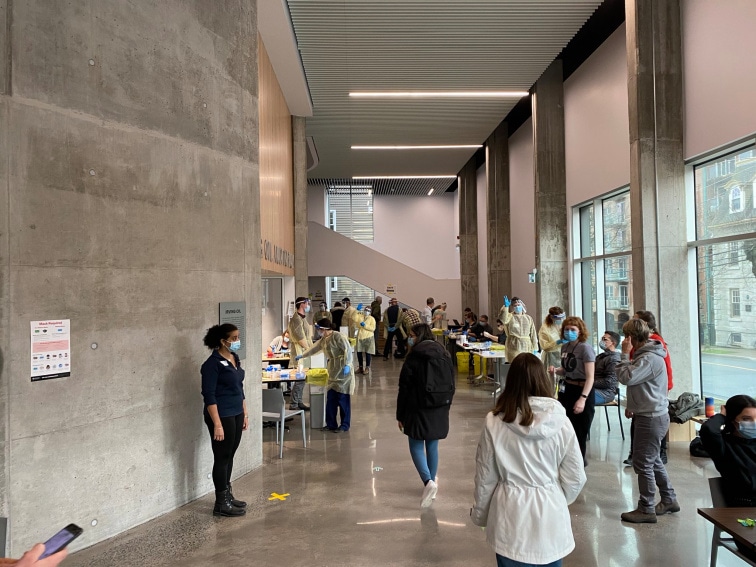
KJIPUKTUK (Halifax) – During his November 17th briefing Chief Medical Officer Dr. Strang emphasized that most COVID outbreaks are concentrated in the 18 – 35 year old demographic who are ‘being overly social’. Young people might think they are healthy but they are putting others at risk, he warned. In his words “we need you [young people] to step up and be a leader so we can get back to a normal life much sooner.”
A few weeks later a close friend of mine got yelled at in Atlantic Superstore by an older man for being one of those reckless and irresponsible youth who have caused all the restrictions in Nova Scotia. This friend not only follows the safety guidelines, but also teaches refugee and immigrant children English. This happened totally unprompted, and she feels singled out solely because of her age.
Since the pandemic began, there have been numerous news headlines and social media posts nationwide disparaging youth as reckless and irresponsible about COVID-19. While this may be true for some of the 18 – 35 year old demographic (which is a wide age span), it is not the case for the majority of youth.
I say this for three reasons: youth are disproportionately represented in the industries most exposed to COVID-19; youth are more likely to be risking exposure in order to protect elderly or more vulnerable loved ones; and lastly because youth have shown great initiative during the pandemic such as volunteering at high rates, voluntarily getting tested while asymptomatic, cancelling life plans that would risk spreading, and more.
In Nova Scotia where the elderly population share is relatively large (the median age is 45+) and there is an existing culture of ageism (seen in difficulties students find getting housing etc…) youth are treated as the scapegoats for COVID-19 spreading and subsequent heightening of restrictions.
I say this from my own lived experience as a young person who has called Nova Scotia home for three years, the stories I hear from my peers, and statistics I’ve learned about while working for the Canadian Council for Youth Prosperity (CCYP).
First of all, from my experience most youth are adhering to household bubbles and gathering limits, and socially distancing and masking when necessary. Nonetheless, concerns over parties exceeding the gathering limits and people not taking proper precautions are real.
I do want to also highlight that elementary and high school students still have the ability to see their classmates, have in person classes and the social interactions that come with that, while all university students in Nova Scotia (save those attending St Francis Xavier University) do not have those opportunities.
I am not writing this to argue whether or not students and young people are partying too much. It would be difficult to track how common these gatherings are and what safety protocols are being practiced.
What I want to do instead is provide a few alternative explanations as to why youth in Nova Scotia may have higher cases of COVID than other demographics. These explanations have nothing to do with partying or being reckless and irresponsible.
According to Statistics Canada, the accommodation and food industry “typically accounts for about one-fifth of youth employment (19.6% in 2019)” nation-wide (Stats Can, October 2020). That includes not only bars, restaurants and hotels, but also youth who work in food delivery or at grocery stores. CCYP’s Youth in Canada profile shows that the top three industries which employed youths are accommodation and food services, retail trade and information, and culture and recreation.
You might ask, if those industries involve greater risk why do youth continue to work in them during a pandemic? These industries provide entry-level and flexible work which, although it pays less and is often precarious, is more accessible to young people who do not have the qualifications or experience required for other industries.
Even when youth have a degree, experience and the skills required, the coronavirus’ economic impacts have massively increased competition in the workforce.
Before the pandemic, youth were doing well, with a national unemployment rate of 10.3% which rose to a staggering 29.4% in May. As of the end of November the unemployment rate has only recovered to 17.4% (Trading Economics). It’s also important to mention that nationwide the health care and social assistance sector is the 6th largest employer of youth – so youth have also been on the frontline during the pandemic as doctors, nurses, paramedics, social workers, mental health professionals, and more (CCYP, 2020, 10).
When the rapid testing clinic opened up in downtown Halifax a few weeks ago, hundreds of asymptomatic young people waited in line for hours in the cold to get tested and do their duty to protect the community.
I know personally of many friends who live or have moved in with family members since the beginning of the pandemic in order to take care of them and take on at-risk activities to protect their elders, such as grocery shopping. Youth are also engaging in these activities for community members and strangers, being active on Facebook groups such as Caremongering Halifax, and volunteering with organizations such as the Dalhousie University Nursing Society who have been doing community food deliveries.
Discussions I’ve had with friends and peers often circulate around: how can I protect my family; Should I travel home for the holidays or is that putting people at risk; How can I make my workplace safer; and Should I even take public transportation anymore?
Meanwhile, many young people have had major life plans cancelled or put on hold, huge milestones that older generations got to experience when they were younger. For example gap year travel, convocation ceremonies, holiday celebrations, weddings, in-person university, etc… have all been cancelled or moved online in this time, with little acknowledgement of how much youth have been asked to give up.
It hurts to be scapegoated for the pandemic while sacrificing so much and genuinely doing your best as a young person to function and keep others safe.
This and the constant negative media barrage, needs to stop if we really want young people to be leaders in our community. To speak directly to Dr. Strang, youth have stepped up during these unprecedented times and are leaders already – you just need to recognize them.
Sabrina Guzman Skotnitsky is a Fellow at the Canadian Council for Youth Prosperity and a Research Assistant at St Francis Xavier University. She has lived in Kjipuktuk (Halifax) on unceded Mi’kmaw territory for three years and is a recent graduate from Dalhousie University.
Check out our new community calendar!
With a special thanks to our generous donors who make publication of the Nova Scotia Advocate possible.
Subscribe to the Nova Scotia Advocate weekly digest and never miss an article again. It’s free!



